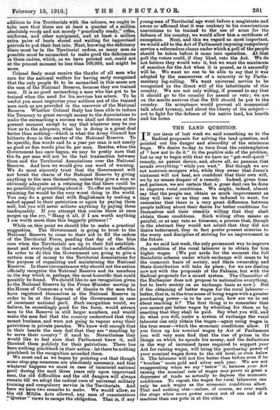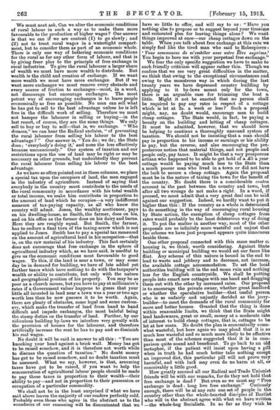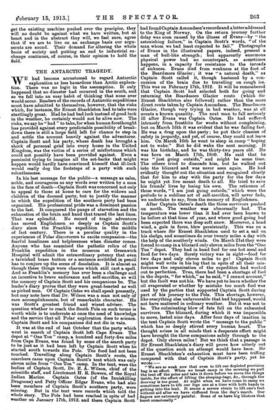THE LAND QUESTION.
IN our issue of last week we said something as to the Radical proposals for solving the land question, and pointed out the danger and absurdity of the minimum wage. We desire to-day to turn from the contemplation of " how not to do it " to the positive side of the problem. Let us say to begin with that we have no "get-well-quick " remedy, no patent device, and, above all, no panacea that mends everything "while you wait." But though we are not nostrum-mongers who, while they swear that Jones's ointment will not heal, are confident that their own will, we by no means despair of a remedy. Indeed, given time and patience, we are certain that a great deal can be done to improve rural conditions. We might, indeed, almost say that the people can obtain as much improvement as they will bear or as they can be induced to want, for remember that there is a very great difference between people talking about their desire for better conditions for themselves and their steadily willing that they shall obtain those conditions. Such willing often means so painful, or at any rate so tiresome, a process that, though in the abstract they would not admit that they did not desire betterment, they in fact prefer present miseries to the worry and discipline of striving for an improvement in the future.
As we said last week, the only permanent way to improve the condition of the rural labourer is to obtain for him higher wages. (We put aside for the moment the full Socialistic scheme under which exchange will cease to be the economic basis of society, and State ownership and State distribution will take its place ; for we are dealing now not with the proposals of the Fabians, but with the Radical proposals for a mixed system. The Chancellor of the Exchequer does not propose to nationalize everything, but to leave society on an exchange basis as now.) But if the obtaining of better wages for the rural labourer— better, that is, in the true sense of being wages with a greater purchasing power—is to be our goal, how are we to set about reaching it ? The first thing is to remember that you cannot get better wages by whistling for them or by enacting that they shall be paid. Say what you will, and do what you will, under a system of exchange the rural labourer can only obtain the wages—again using wages in the true sense—which the economic conditions allow. If you force up his nominal wages by Act of Parliament you will very soon find that the rise of prices in the things on which he spends his money, and the deductions in the way of increased taxes required to support your Act for raising wages, will bring the purchasing power of your nominal wages down to the old level, or even below it. The labourer will not live better than before even if ho " touches " more gold and silver each year. We are not
exaggerating when we say " below " it, because your Act raising the nominal rate of wages may prove so great a depresser of trade as actually to depress the economic conditions. To repeat, the wages for rural labourers can only be such wages as the economic conditions allow.
That and nothing else—unless, of course, we ever reach the stage when more power comes out of one end of a machine than one puts in at the other. We must next ask, Can we alter the economic conditions of rural labour in such a way as to make them more favourable to the production of higher wages ? Our answer is that we can if we are content (1) to go slowly ; and (2) not to treat rural wages in a watertight compart- ment, but to consider them as part of an economic whole. There is only one way of bettering economic conditions for the rural as for any other form of labour, and that is by giving freer play to the principle of free exchange in rural industries. To give the rural labourer a larger share of wealth we must have more wealth to distribute. But wealth is the child and creation of exchange. If we want more wealth we must have more exchanges. But if we want more exchanges we must remove every obstacle and every source of friction to exchanges—must, in a word, not discourage but encourage exchanges. The most potent way of encouraging exchanges is to leave people economically as free as possible. No man can sell what he has got to sell to the best advantage unless he is left free in the difficult work of selling. Therefore we must not hamper the labourer in selling or buying—in the last resort, of course, they are the same things. We only sell to buy or buy to sell—that is, we exchange. " Who dreams," we can hear the Radical exclaim, " of preventing the rural labourer from selling his labour to the best advantage ? " Our answer is, "You do ; we do; the State does ; ' everybody's doing it,' and none the less effectively because unconsciously." Our system of taxation and our restrictions upon the use of land may be right or may be necessary on other grounds, but undoubtedly they prevent the rural labourer from selling his labour to the best advantage.
As we have so often pointed out in these columns, we place a special tax upon the occupiers of land, the men engaged in the industry of agriculture. Instead of saying that everybody in the country must contribute to the needs of the rural community in accordance with his total wealth or total income, we make him contribute in proportion to the amount of land which he occupies—a very indifferent measure of tax-paying capacity, as all who know the country will admit. Jones, the wealthy auctioneer, pays on his dwelling-house, as Smith, the farmer, does on his, and on his office as the farmer does on his dairy and barns. Here they are roughly equal. But Smith, the farmer, has to endure a final turn of the taxing-screw which is not applied to Jones. Smith has to pay a special tax measured on the amount of agricultural land in his occupation—that is, on the raw material of his industry. This fact certainly does not encourage that free exchange in the sphere of agricultural industry which, as we have said, is needful to give us the economic conditions most favourable to good wages. To this, if the land is near a town, or may some day be in demand for building, we have of late added yet further taxes which have nothing to do with the taxpayer's wealth or ability to contribute, but only with the nature and geographical position of his property. You may be as poor as a church mouse, but you have to pay at millionaire's rates if a Government valuer happens to guess that your little all invested in land near a town was a year or two ago worth less than he now guesses it to be worth. Again, there are plenty of obstacles, some legal and some custom- ary, which make the transfer of land from band to hand difficult and impede exchanges, the most baleful being the stamp duties on the transfer of land. Further, by our ridiculous building by-laws we interfere very greatly with the provision of houses for the labourer, and therefore artificially increase the rent he has to pay and so diminish his real wages.
No doubt it will be said in answer to all this : "You are knocking your head against a brick wall. Money has got to be raised somehow, and it is therefore not worth while to discuss the question of taxation." No doubt money has got to be raised somehow, and no doubt taxation must be assumed. What we say, however, is that, assuming taxes have got to be raised, if you want to help the remuneration of agricultural labour people should be made to pay those taxes in proportion to their wealth—their ability to pay—and not in proportion to their possession or occupation of a particular commodity.
We shall not be in the least surprised if what we have said above leaves the majority of our readers perfectly cold. Probably even those who agree in the abstract as to the soundness of our reasoning will be discontented that we have so little to offer, and will say to us : " Have you nothing else to propose or to suggest beyond your tiresome and reiterated plea for leaving things alone ? We want things improved at once—our cheap cottages down on the table. When you talk about free exchange at this rate we simply feel like the tired man who said to Robespierre : ' Vous commencez de m'embeter avec votre Etre supthne.' You begin to bore me with your perpetual free exchange." We fear the only specific suggestion we have to make to such friendly criticism will appear rather thin. Though we confess that we see very great difficulties in the matter, we think that owing to the exceptional circumstances and owing to the monstrous way in which during the last twenty years we have depressed country building by applying to it by-laws meant only for the town, there is an arguable case for trimming the boat a, little. Might it not be enacted that no person shall be required to pay any rates in respect of a cottage which is let at 2s. a week or less ? Such a proposal might, nay, no doubt would, encourage men to build cheap cottages. The State would, in fact, be paying a bounty on the building and letting of cheap cottages. It must be admitted, however, that we should here be helping to continue a thoroughly unsound system of taxation. We should not be insisting that a man should pay in proportion to his income or earnings or his ability to pay, but the reverse, and also encouraging the pre- posterous notion that material things, and not people and people only, pay taxes. It might be that a very prosperous artisan who happened to be able to get hold of a £5 a year cottage would be paying much less to the State than a much poorer man who lived in a town or did not have the luck to secure a cheap cottage. Again the proposal must be in the nature of taxing the town for the benefit of the country. No doubt there is a considerable contra. account in the past between the country and town, but after all two wrongs do not make a right. In a word, if pressed, we must admit that a very great deal can be said against our suggestion. Indeed, we hardly want to put it higher than this : If the country as a whole is determined to do something in the way of encouraging rural housing by State action, the exemption of cheap cottages from rates would probably be the least deleterious way of doing it. To put the matter in another way, most of the other proposals are so infinitely more wasteful and unjust that the scheme we have just proposed appears quite innocuous beside them.
One other proposal connected with this same matter o; housing is, we think, worth considering. Against State building or municipal building we would set our faces like flint. Any scheme of this nature is bound in the end to lead to waste and jobbery and to decrease, not increase, the available cottage accommodation. To set the local authorities building will in the end mean ruin and nothing less for the English countryside. We shall be putting people into smart new cottages with one hand and dragging them out with the other by increased rates. Our proposal is to encourage the private owner, whether great landlord or whether the speculative builder—that useful person who is so unfairly and unjustly derided as the Jerry- builder—to meet the demands of the rural community for more and better houses. Granted that the thing is done within reasonable limits, we think that the State might lend landowners, great or small, money at a moderate rate of interest to build cheap cottages, that is, cottages to be let at low rents. No doubt the plan is economically some- what wasteful, but here again we may plead that it is so much less wasteful and so much more likely to be effective than most of the schemes suggested that it is in com- parison quite sound and beneficent. To go back to an old metaphor, if the patient will insist upon having a pill when in truth he had much better take nothing except an improved diet, this particular pill will not prove very harmful, and with luck may even do no harm at all, or conceivably a little good. How greatly amused all our Radical and Trade Unionist friends will be with our remarks, for do they not hold that free exchange is dead ? But even so we must say " Free exchange is dead : long live free exchange." Curiously enough, there will be at any rate one set of people in the country other than the whole-hearted disciples of Bastiat who will in the abstract agree with what we have written —the whole-hog Socialists. In so far as they -wish to get the existing machine pushed over the precipice, they will no doubt be against what we have written, but at heart and in the abstract they will, we feel sure, agree that if we are to live on an exchange basis our argu- ments are sound. Their demand for altering the whole basis of society and putting an end to industrial ex- change continues, of course, in their opinion to hold the field.












































 Previous page
Previous page